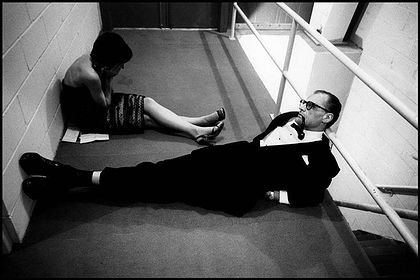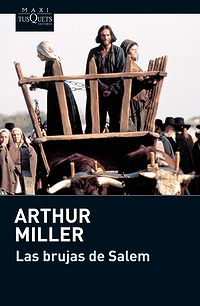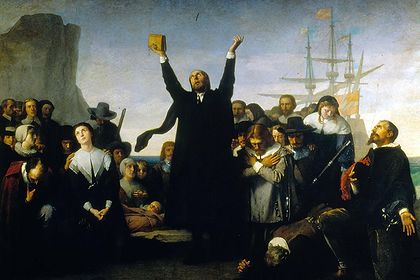Arthur Miller and the American Dream
The story of “The Crucible” reveals a dark side to the United States, where many people are still trying to build a New Jerusalem.
17 MARCH 2015 · 17:30 CET

This year marks the centenary since the birth of Arthur Miller, the playwright who shattered the mirage of the American Dream. He died ten years ago in his ranch in Connecticut (New England). The sober and direct style of the author of “Death of a Salesman” or “A View from the Bridge”, both profoundly human and critical, had a strong impact in Spain, where he was awarded the Principe de Asturias prize in 2002. The story of “The Crucible” reveals a dark side to the United States. It tells of the myth of a Christian America, which many people still use as a basis for their efforts to build a New Jerusalem on earth.
Miller, Jewish of Polish origins, was born in the New York neighbourhood of Harlem in 1915. His father owned a successful textile business next to Central Park, which was swept away by the Great Depression, after which the family had to move to a tiny apartment on the outskirts of the city. Although his mother was a primary school teacher, he only ever went twice to the theatre as a child. He struggled his way through high school, preferring sports to books, but a rugby injury got him out of fighting in the II World War.

He had a number of small jobs, working in a scrapyard, in a store and even washing dishes, to pay his way through his journalism studies. He was 28 when his first play opened in 1944, but the show closed after only two weeks, having received disastrous reviews. He then turned to writing novels. His book “Focus” (1945) is a curious allegation against American Anti-Semitism, which was made into a film by the renowned actor William Macy.
Miller returned to the theatre with “All My Sons” (1947), which was a big success and ran for a year. It is the drama of an unscrupulous businessman who sells faulty material to the army. The main character (Joe Keller) is a failed sixty-year old man, similar to the character in “Death of a Salesman”, but Miller wrote the play when he was only 30. He always appeared older than his years. In reality, he was only 11 years older than Marilyn Monroe –who he married after breaking up his peaceful and long marriage with his high-school sweetheart, Grace, with whom he had two sons–.
TRAGEDY AND THE COMMON MAN

The tragedy of the pathetic character in the play reflects the misfortune of the contemporary man. Loman is a travelling salesman, who carries a briefcase full of products that no one is interested in buying. When he is close to retirement he asks his boss for a raise, but he only succeeds in getting sacked in a terrible denouement which ends in his suicide – similar to Joe Keller’s suicide in “All my sons”–, so that at least his poor children may draw on his life insurance.
Miller gets under our skin because he is talking about us. There seems to be a strange parallel between our own and Loman’s destiny, where our fear is that the earth that Linda –his devastated and loving wife – throws on his coffin becomes a metaphor for our own burial. The tears that we shed at the tragedy of this ridiculous man, seem to reflect own failures as fathers and draw on the pathetic poignancy of the exaltation of values that ultimately lead to our own destruction. This is a timeless play, because it touches our innermost being.
THE PRINCE AND THE SHOWGIRL
In “A View from the Bridge” (1955), Miller explores the world of Italian immigrants. Its release coincided in the United States with his marriage to Marilyn Monroe. The marriage lasted for almost five years. For her, it was the longest and most solid relationship she ever had, for him it was the shortest. The actress died a year after their separation.
While many view Marilyn as nothing more than an object of desire, she was a sensitive reader who secretly wrote. The poems published after her death shed some light on her tormented personality. They are full of dark omens (“Oh damn, I wish I were dead/ Absolutely nonexistent/ Gone away from here/ From everywhere) and anxious calls for help (Help Help
Help I feel life coming closer/ When all I want is to die).

For Miller, “she was a poet on a street corner trying to recite to a crowd pulling at her clothes”. She was a Pygmalion to him. In order to marry him, she converted to Judaism. Her symbiosis seemed complete. She said that she felt protected for the first time in her life. She called Miller “papa” and she was set on getting rid of her blonde bimbo image. She helped Miller gain a foothold in the world of cinema, but the relationship soured, leading to mutual recriminations and severe episodes of alcoholism.
The drama of his marriage to Marilyn is well reflected in the play “After the Fall” (1964), which tried to exorcise the demons of the relationship. Miller was not the prince played by Laurence Olivier and he did not manage to redeem Marilyn, the showgirl. According to him she was incapable of existing for her own sake. In his memoirs “Timebends”, he said that her life was the interpretation of a role which she could not play. One of the main reasons for Marilyn’s bouts of depression were her miscarriages, and she was never able to have children.
In the film that he wrote for John Huston, “The Misfits” (1961), the character played by Clark Gable – who died shortly after playing that role – asks the character played by Marilyn “What makes you so sad? I think that you are the saddest girl I’ve ever met”. During the filming, Miller met an Austrian photographer called Inge Morath, who had fled from the Nazis to work in Paris. She would become his next wife, and their marriage lasted until she died in 2002. Their daughter, Rebecca, is now a film director and is married to the actor Daniel Day-Lewis. She has a brother with Down-syndrome.
THE CRUCIBLE

What happened in Salem in 1692 should be seen in the context of the puritan dream of recovering a lost paradise, even if in an austere and vain way. The devil appears precisely in this perfectionist desire to cleanse society as if in a crucible. The constant pressure to dedicate every part of one’s life to the glory of God thus opens an unexpected door to the devil, when some girls accuse various members of the community of witchcraft at a time when the pastor is struggling against a group within the church bent on putting an end to his ministry.
The character of Judge Danforth, played in the film by the brilliant actor, Paul Scofield, is a man who sincerely wishes to quash the devil’s power. The actor said that he drew inspiration from Thomas Moore, the model of integrity who was immortalized in Robert Bolt’s play “A man for all seasons”, directed on screen by Fred Zinnermann. Before becoming a catholic martyr under Henry VIII, Moore had gone about burning protestants with considerable zeal.
It is that erring zeal which unleashes the persecution for which Proctor (Daniel Day-Lewis) feels a certain guilty due to his adulterous obsession for Abigail (Winona Ryder). While the actions of Pastor Parris are chiefly directed by his fear of losing his position, Pastor Hale, an expert in demonology, could make us think of a number of exalted evangelical specialists around today and of their “spiritual wars”. His task is to discover the “Devil…stripped of all his brute disguises”, in order to “crush him utterly” if he shows his face. He sees curses in everything, but he is going to “rip and tear [the Devil’s grip]” to turn all into “convenanted Christians”.
THE MYTH OF CHRISTIAN AMERICA
The belief that a nation can have a special relationship with God does indeed have its roots in the Bible. Israel was God’s chosen people in the Old Testament, but in the New Testament we do not find any Christian nation. Some Christians believe that their countries are Christian because their customs and way of thinking more or less follow the rules of divine justice. Others believe that their institutions embody certain Christian principles, which allow them to qualify their country as Christian. But there are others that go so far as to believe that God has a special relationship with one country in particular, in this case, the United States.

The efforts of many North-American evangelicals to re-establish a Christian heritage which is threatened with extinction, reminds us of the other side of the American Dream as described by Miller. One of the main characteristics of the foundation of the United States was that shared faith in God, who for men like Jefferson or Franklin had more to do with a deist ideology than with an orthodox Christian faith. Their acceptance, nevertheless, of traditional moral teaching meant that expressions in the American Constitution such as “the God of nature”, “the Creator” or “divine providence” were given a Christian meaning.
The puritans of New England repeatedly claimed that God had made a pact with the American people, who saw the foundation of the colonies as the beginning of the millennial period. The success of weapons during the War of Independence was seen as a special providential intervention, through which America’s cause became united with Christ’s cause, according to a pious Presbyterian at the time. Alexander Campbell, the founder of the Churches of Christ, even said that after the Incarnation, the 4 of July was the most important day in the history of humanity. During the civil war, both the North and the South used the Bible to defend their respective causes, not on grounds of law or justice, but as if it was “Christ’s cause”.
The Scriptures have nothing against a love for one’s homeland, but some refer to Christian America as if the history of this country were a continuation of the story of salvation. This is not an error, but a heresy. In the history of humanity only one nation– Israel in the Old Testament– has had a special relationship with God. No country today, including the United States, can be God’s New Israel. Christianity has had a great influence on American history. Many good things, but also a lot of evil, has been done in the name of Christ in that country. One only needs to think of the treatment given to the poor and disabled members of society, for whom the Bible asks special attention. This is not to mention the extermination of Native Americans and the support of slavery.
This does not mean that the United States is any worse than any other nation. What Miller points to is the danger of wanting to build a New Jerusalem on Earth. Until God’s Kingdom is established, any human institution will be flawed. The best political theories and attempts to give it shape through laws, are affected by the inevitable fact that all thinkers, politicians, governors, and citizens are sinners, whereby our selfishness spoils even the best of schemes. Man dreams up utopias, but once and again they end up in the reality of disillusionment. The ideal governor always ends up abusing his power, due to greed, immorality and selfishness; and people often have the governors that they deserve, since we all seek our own interest and privilege. Ultimately, the enemy is within us.
God’s Kingdom, however, has a great future. The best is yet to come and in Christ we are “more than conquerors” (Romans 8:37). This is why when we pray “Your kingdom come”, we do it with the certainty that that Kingdom is already here, even though it has not yet been consummated. This will finally happen when the King returns, and every knee shall bow and every tongue confess that Christ is Lord (Philippians 2:10-11). All rebellion and arrogance will then be submitted to the supreme authority of God. We will then see how “The kingdom of the world has become the kingdom of our Lord and of his Messiah, and he will reign for ever and ever. (Revelation 11:15).
Published in: Evangelical Focus - Between the Lines - Arthur Miller and the American Dream
